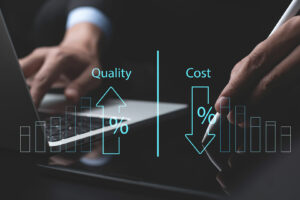
In the dynamic field of facilities management, the art and science of supplier management stand at the forefront of operational excellence. It’s a multifaceted endeavour beyond the mere selection of vendors; it requires a deep dive into the intricacies of managing their performance.
At the heart of this challenge is upholding unwavering service levels, assuring uncompromising quality, and enforcing robust accountability.
These elements are not just operational necessities but are also pivotal in shaping the reputation and functionality of any facility. In the facilities services sector, every supplier interaction and every service delivered plays a critical role in delivering excellent workplace experiences.
Challenges in Facilities Management Supplier Performance
Facilities management encompasses a broad spectrum of services, each integral to a facility’s seamless operation and maintenance. Challenges in this sector can significantly impact overall operations and the facility’s reputation.
- Inconsistent Service Levels: Variability in service delivery, ranging from maintenance to security, can cause dissatisfaction among stakeholders and lead to operational inefficiencies. This inconsistency can stem from a lack of standardised processes or misaligned expectations between the facility and its suppliers or subcontractors.
- Quality Concerns: The quality of services directly impacts the facility’s safety, functionality, and aesthetics. Subpar services can result in safety hazards, decreased functionality of the facility, and a tarnished public image.
- Accountability Issues: Suppliers and subcontractors may not consistently meet their obligations without clear accountability measures. This lack of accountability can lead to unresolved issues and declining service standards.
- Compliance Risks: Non-compliance with industry standards, regulations, and insurance requirements poses significant risks. Failure to comply with standards can lead to legal ramifications and financial losses.
- Insurance and Liability: Ensuring that suppliers have adequate and appropriate levels of insurance is crucial. Inadequate coverage can leave the facility exposed to risks and liabilities in case of accidents or failures.
- Complexity in Management: Managing a diverse range of suppliers or subcontractors, each with different service offerings, contracts, and standards, adds complexity to the facilities management role.
The Importance of SPM and SRM in Addressing These Challenges
Implementing Supplier Performance Management (SPM) and Supplier Relationship Management (SRM) strategies is vital in effectively overcoming these challenges.
- Setting Clear KPIs: Establishing and aligning Key Performance Indicators (KPIs) with different service areas is essential. These KPIs should encompass service quality, compliance, and timeliness, ensuring that expectations are clear, measurable, and aligned with the facility’s goals.
- Transparency and Alignment: Maintaining open communication and alignment with suppliers and subcontractors on goals, performance metrics, and compliance requirements is crucial. This transparency fosters mutual understanding and sets a foundation for successful collaboration.
- Performance Tracking Against KPIs: Regularly monitoring supplier performance against set KPIs helps identify areas for improvement. This tracking should include compliance adherence and risk management, such as insurance and liability coverage.
- Risk Management Focus: Incorporating risk management into SPM and SRM processes ensures compliance and insurance requirements are consistently met, reducing potential liabilities and enhancing safety.
- Action Plans and Collaborative Working: Developing action plans for underperformance, especially in areas of high risk or non-compliance, and working collaboratively with suppliers can foster a partnership approach. This collaboration is crucial for problem-solving and continuous improvement.
By addressing these expanded challenges through robust SPM and SRM strategies, facilities managers can significantly improve supplier performance, ensuring services are delivered efficiently, safely, and to the highest standards.
Technology For Supplier Performance Management
The complexities and challenges in managing supplier performance in facilities management underscore the need for innovative solutions. This is where cloud-based supplier management platforms emerge, a technological advancement reshaping how facilities managers interact with and manage their suppliers.
Centralised Cloud-Based Management
A cloud-based supplier management platform offers a centralised repository for all supplier-related data. This consolidation of information eliminates the silos of data spread across various systems or physical files. Having all data in one place, from contact information to service agreements, streamlines the management process, making it more efficient and less prone to errors.
Certification and Compliance Management
One of the critical aspects of supplier management is ensuring compliance with industry standards and regulations. Software platforms simplify this process by allowing facilities managers to store, track, and manage certifications and documentation. Automatic reminders for certification renewals and easy access to compliance records ensure that suppliers adhere to the required standards, mitigating risks associated with non-compliance.
Streamlined Supplier Onboarding
The onboarding of new suppliers can often be a time-consuming process. Supplier management platforms can streamline this, making bringing new suppliers into the fold easier and faster. By standardising the onboarding process, facilities managers can ensure that all necessary information is collected consistently and stored securely.
Comprehensive Supplier Relationship Management (SRM)
At the heart of effective supplier management is strong relationship management. Cloud-based platforms offer comprehensive SRM capabilities, enabling facilities managers to monitor and evaluate supplier performance against specific KPIs. This continuous assessment helps identify areas of improvement and fosters an environment of continuous development and collaboration.
Enhanced Communication and Collaboration
Effective communication is key to any successful supplier relationship. Cloud-based platforms facilitate robust communication channels, allowing for seamless interactions between facilities managers and their suppliers. This enhanced communication fosters a collaborative working relationship, which is essential for promptly and efficiently addressing issues.
How SourceDogg can Help…
Addressing the complex challenges of supplier performance in facilities management requires a reliable, efficient solution. SourceDogg is a cloud-based supplier management platform that integrates essential features for managing supplier relationships effectively.
With SourceDogg, facilities managers gain access to tools for compliance, risk management, performance tracking, and collaborative communication. This straightforward, professional approach ensures that operations are streamlined, and service quality is enhanced, leading to well-managed facilities that meet the highest standards. SourceDogg is the perfect choice for facilities managers looking to confidently and efficiently improve supplier management.
Ready to take your facilities management to the next level?
Speak to one of our supplier management experts today and discover how SourceDogg can transform your supplier relationships. Get a personalised demo and see firsthand the difference SourceDogg can make in streamlining your operations and enhancing service quality.
Contact us now and start your journey towards more efficient, effective supplier management.





